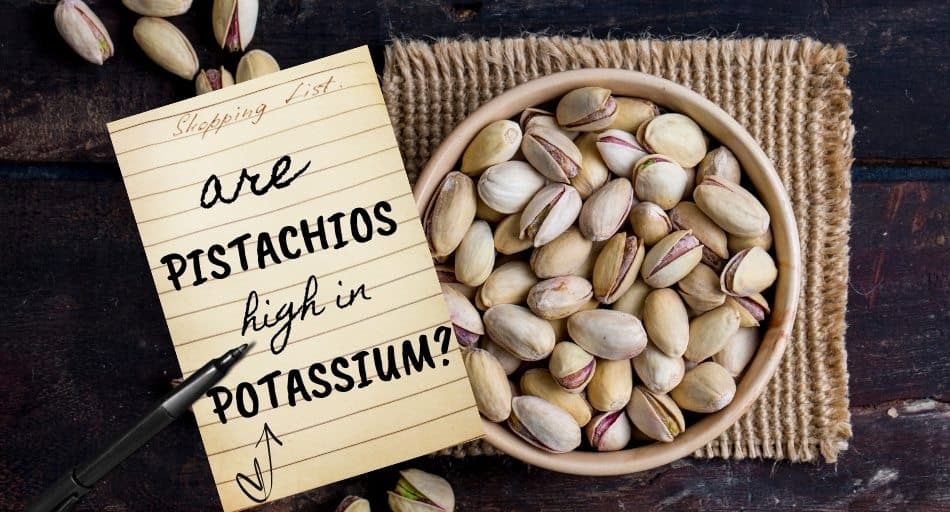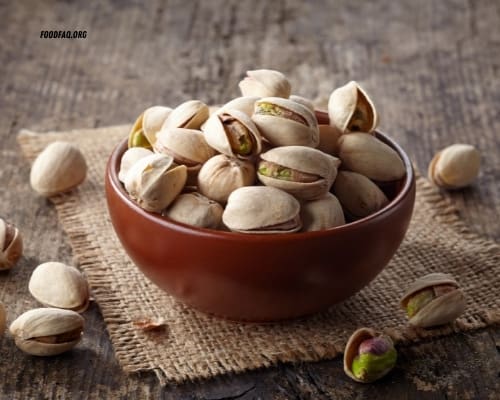Pistachios are a very healthy nut, loaded with an abundance of minerals and vitamins. They’re very easy to add to any diet, whether as part of a larger meal or just as a snack. But if you follow a low-potassium diet, it’s important to know whether the foods you eat are suitable for your health and dietary needs.

If you take in too much potassium while your kidneys aren’t able to metabolize it, you can develop many serious health problems. So, are pistachios high in potassium?
Table of Contents
Are Pistachios High In Potassium?
Even though pistachios are nutritious and good for overall health, they are the type of nuts that contains the most potassium per single serving. As a result, consumption of pistachios should be carefully monitored or even completely eliminated from the diet if one follows a diet particularly low in potassium.
On the bright side, if you can tolerate some high-potassium foods, choosing pistachios is a great idea as they contain many plant compounds that help you ward off various health conditions.
How much potassium is in pistachios?
A one-ounce serving of pistachios contains around 292mg of potassium. This means that this type of nut should be avoided or limited on a low-potassium diet. Doing so will help you prevent many serious health conditions from developing.
Unfortunately, pistachios are also very calorie-dense, making it easy to overeat them and consume even more potassium. As a result, it’s important to practice mindful eating and portion control. It also might be a good idea to include very small amounts of pistachios in your meals to prevent potassium from accumulating in your kidneys.
RELATED: Can You Check Your Potassium Level At Home?
Another thing to note is that raw pistachios contain around the same amount of potassium as dry or oil roasted pistachios. Roasted pistachios are also tastier and more common in grocery stores.
They also both contain around the same nutritional values but may differ in sodium, depending on whether any salt was added during the production process.
Are pistachios good for you?
Pistachios are incredibly nutritious, containing a good amount of protein and healthy fats. These two nutrients are essential in ensuring that you stay full after a meal, thus preventing overeating.
Protein also contributes to fueling your muscles, ensuring that they don’t become an energy source instead of fat. On the other hand, fat helps your body absorb fat-soluble vitamins, so it’s important to consume healthy fats with each meal.
This type of nut is also high in thiamin – a vitamin responsible for turning carbohydrates into energy. It’s also essential for glucose metabolism and plays a major role in nerve, muscle, and heart function.

Because of that, it’s important to consume foods high in this micronutrient, including whole grains, meat, fish, and nuts. Also referred to as vitamin B1, it also helps in proper kidney function, which is beneficial for people with potassium sensitivity or other kidney issues.
Pistachios are one of the most vitamin B6-rich foods available. This vitamin helps regulate blood sugar levels and form hemoglobin, which helps transport oxygen in red blood cells. It’s also crucial for maintaining a good mood and preventing anxiety and depression.
Because of that, experts recommend consuming a lot of vitamin B6 if you live in cold, cloudy regions, as the residents of such places are more prone to seasonal depression.
RELATED: Are Cashews High In Potassium?
Among other nuts, pistachios contain an abundance of antioxidants that help prevent oxidative stress and damage. The specific type of antioxidants present in pistachios helps prevent age-related macular degeneration, which causes you to lose your eyesight over time.
Adding pistachios to your diet can help you load up on these essential plant compounds and reap their excellent benefits.
Pistachios pack quite a good amount of fiber, which means that they can help you lose weight. This is because fiber helps soak up excess stomach acid, preventing acid reflux and filling you up – particularly if consumed with a lot of water.
Fiber also makes you consume fewer calories, which leads to healthy weight loss without any health complications. Another factor that makes this carbohydrate beneficial is that it feeds the good gut bacteria in your stomach, protecting your digestive system from inflammation.
Is pistachio butter high in potassium?

Pistachio butter contains around the same amount of potassium as raw or dry roasted pistachios. The only difference is that pistachio butter is usually consumed in smaller quantities than raw pistachio nuts.
As a result, pistachio butter is also lower in other essential micronutrients and minerals that help you stay healthy but still very high in calories. Therefore, just like other nut kinds of butter, it’s important to consume it sparingly and only every once in a while.
RELATED: Is Peanut Butter High In Potassium?
Can you take in too much potassium from pistachios?
Since a single serving of pistachios contains more than a recommended amount of potassium for a low-potassium diet, it’s easy to intake too much of this mineral. Because of that, it’s important to limit the consumption of this type of nut.
What’s more, most people eat pistachios as a snack, which means that they’re very likely to eat more than one ounce in a sitting. Due to that, the potassium content adds up rather quickly, leading to unpleasant symptoms.
RELATED: Is Oatmeal High In Potassium?
Many people also tend to be allergic to pistachios. This means that if you consume pistachios while you’re sensitive to potassium and allergic to pistachios, your symptoms will be much worse.
While it might seem odd to consume something you’re allergic to, many people do that if their allergies aren’t too severe. But if you also suffer from potassium sensitivity, it’s best to avoid pistachios altogether.
Pistachios contain a lot of potassium in one serving, which means that they’re classified as high-potassium foods that should be either limited or avoided on a low-potassium, kidney-friendly diet.
On the other side, pistachios are incredibly nutritious and rich in various plant compounds that are very good at preventing severe health conditions, including kidney problems, digestive system issues, and inflammation. So, if you can tolerate some pistachios every once in a while, they’re a very beneficial addition to your diet.
Don't know which foods are high in potassium? Read our article, 15 Best Food Sources of Potassium. We also have a guide to this important mineral: Potassium 101: All You Need To Know About Potassium.
